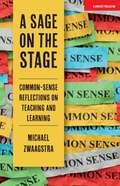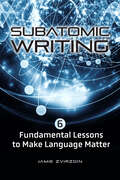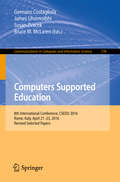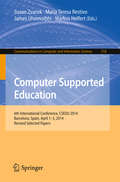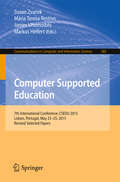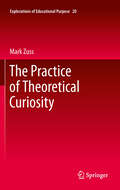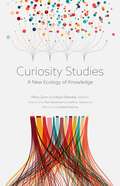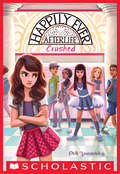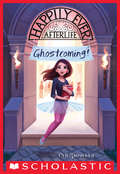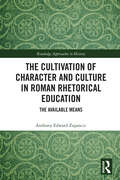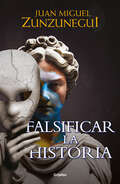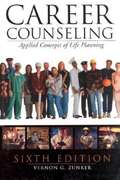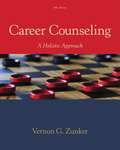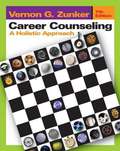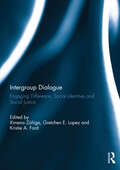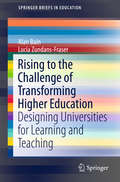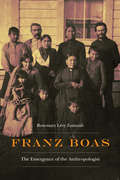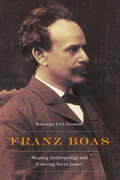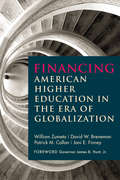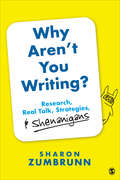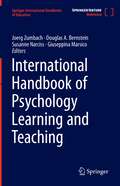- Table View
- List View
A Sage on the Stage: Common Sense Reflections on Teaching and Learning
by Michael ZwaagstraA collection of articles on what works for teachers and learners in the classroom - and what doesn't. Covers topics from school discipline to content knowledge to no-zero policies. Michael Zwaagstra is a public high school teacher and author. He has extensive teaching experience at a variety of grade levels and currently teaches high school social studies in Manitoba.
Subatomic Writing: Six Fundamental Lessons to Make Language Matter
by Jamie ZvirzdinSee science writing fundamentals afresh through a subatomic lens!In Subatomic Writing, Johns Hopkins University instructor Jamie Zvirzdin goes bravely into uncharted territory by offering a totally new kind of guide for writing about science—from the subatomic level up! Subatomic Writing teaches readers that the building blocks of language are like particles in physics. These particles, combined and arranged, form something greater than their parts: all matter in the literary universe. The six levels of language covered in this guide create writing that illuminates and energizes the reader to feel, learn, change, and act. This interdisciplinary approach helps scientists, science writers, and editors improve their writing in fundamental areas as they build from the sounds in a word to the pacing of a paragraph. These areas include• Sound and sense• Word classes• Grammar and syntax• Punctuation• Rhythm and emphasis• Pacing and coherenceEqually helpful for students who need to learn how to write clearly about science and scientists who need to hone their writing skills to create more effective course material, papers, and grant applications, this guide builds confidence in writing abilities as old skills are taught in new, exciting ways. Each lesson provides exercises that build on each other, strengthening readers' capacity to communicate ideas and data, all while learning basic particle physics along the way.
Computers Supported Education: 8th International Conference, CSEDU 2016, Rome, Italy, April 21-23, 2016, Revised Selected Papers (Communications in Computer and Information Science #739)
by Susan Zvacek James Uhomoibhi Gennaro Costagliola Bruce M. MclarenThis book constitutes the thoroughly refereed proceedings of the 8th International Conference on Computer Supported Education, CSEDU 2016, held in Rome, Italy, in April 2016. The 29 revised full papers were carefully reviewed and selected from 164 submissions. The papers deal with the following topics: new educational environments, best practices and case studies of innovative technology-based learning strategies, institutional policies on computer-supported education including open and distance education.
Computer Supported Education: 6th International Conference, CSEDU 2014, Barcelona, Spain, April 1-3, 2014, Revised Selected Papers (Communications in Computer and Information Science #510)
by Susan Zvacek Markus Helfert Maria Teresa Restivo James UhomoibhiThis book constitutes the refereed proceedings of the 6th International Conference on Computer Supported Education, CSEDU 2014, held in Barcelona, Spain, in April 2014. The 24 revised full papers presented were carefully reviewed and selected from 242 submissions. The papers address topics such as information technologies supporting learning; learning/teaching methodologies and assessment; social context and learning environments; domain applications and case studies; and ubiquitous learning.
Computer Supported Education: 7th International Conference, CSEDU 2015, Lisbon, Portugal, May 23-25, 2015, Revised Selected Papers (Communications in Computer and Information Science #583)
by Susan Zvacek Markus Helfert Maria Teresa Restivo James UhomoibhiThis book constitutes the refereed proceedings of the 6th International Conference on Computer Supported Education, CSEDU 2014, held in Barcelona, Spain, in April 2014. The 24 revised full papers presented were carefully reviewed and selected from 242 submissions. The papers address topics such as information technologies supporting learning; learning/teaching methodologies and assessment; social context and learning environments; domain applications and case studies; and ubiquitous learning.
The Practice of Theoretical Curiosity
by Mark ZussThe desire for knowledge is an abiding facet of human experience and cultural development. This work documents curiosity as a sociohistorical force initiating research across the disciplines. Projects generated by theoretical curiosity are presented as historical and material practices emerging as expressions of embodied knowledge and experience. The shifting cultural, philosophical and practical relations between theory and curiosity are situated within classical, medieval, early modern and contemporary communities of practice. The Practice of Theoretical Curiosity advocates for a critical, aesthetic engagement in everyday life. Its purpose is to examine the pedagogical grounds and questions that motivate research programs in the sciences, education, technoculture and post-war social movements. Theoretical curiosity continually resists disciplinary limits. It is a core, embodied process uniting human pursuits of knowledge and power. This inquiry into inquiry itself offers an appreciation of the vital continuity between the senses, perception, and affect and concept development. It is informed by a critical reading of phenomenology as the embodied practice of researchers. This study sponsors a deepening of theory in practice and the practice of theoretical exploration. As a contribution to pedagogical practice, it offers a historical critique of the usually unquestioned philosophical, political and ethical grounds for educational, scientific and social research. The Practice of Theoretical Curiosity profiles significant alliances and persona as agents for the pursuit of novel and often controversial research, adventures and discovery. It claims that the place of technology and the technical is the primary channel for contemporary inquiry. The technosciences of genomics, artificial life and astrobiology are considered as contemporary extensions of a perennial desire to pursue and resist the limits of existing knowledge and representation.
Curiosity Studies: A New Ecology of Knowledge
by Perry Zurn Arjun ShankarThe first English-language collection to establish curiosity studies as a unique field From science and technology to business and education, curiosity is often taken for granted as an unquestioned good. And yet, few people can define curiosity. Curiosity Studies marshals scholars from more than a dozen fields not only to define curiosity but also to grapple with its ethics as well as its role in technological advancement and global citizenship. While intriguing research on curiosity has occurred in numerous disciplines for decades, no rigorously cross-disciplinary study has existed—until now. Curiosity Studies stages an interdisciplinary conversation about what curiosity is and what resources it holds for human and ecological flourishing. These engaging essays are integrated into four clusters: scientific inquiry, educational practice, social relations, and transformative power. By exploring curiosity through the practice of scientific inquiry, the contours of human learning, the stakes of social difference, and the potential of radical imagination, these clusters focus and reinvigorate the study of this universal but slippery phenomenon: the desire to know. Against the assumption that curiosity is neutral, this volume insists that curiosity has a history and a political import and requires precision to define and operationalize. As various fields deepen its analysis, a new ecosystem for knowledge production can flourish, driven by real-world problems and a commitment to solve them in collaboration. By paying particular attention to pedagogy throughout, Curiosity Studies equips us to live critically and creatively in what might be called our new Age of Curiosity.Contributors: Danielle S. Bassett, U of Pennsylvania; Barbara M. Benedict, Trinity College; Susan Engel, Williams College; Ellen K. Feder, American U; Kristina T. Johnson, Massachusetts Institute of Technology; Narendra Keval; Christina León, Princeton U; Tyson Lewis, U of North Texas; Amy Marvin, U of Oregon; Hilary M. Schor, U of Southern California; Seeta Sistla, Hampshire College; Heather Anne Swanson, Aarhus U.
Rule of Law Dynamics
by Michael Zürn André Nollkaemper Randall PeerenboomThis volume explores the various strategies, mechanisms, and processes that influence rule of law dynamics across borders and the national/international divide, illuminating the diverse paths of influence. It shows to what extent, and how, rule of law dynamics have changed in recent years, especially at the transnational and international levels of government. To explore these interactive dynamics, the volume adopts an interdisciplinary approach, bringing together the normative perspective of law with the analytical perspective of social sciences. The volume contributes to several fields, including studies of rule of law, law and development, and good governance; democratization; globalization studies; neo-institutionalism and judicial studies; international law, transnational governance, and the emerging literature on judicial reforms in authoritarian regimes; and comparative law (Islamic, African, Asian, Latin American legal systems).
Crushed (Happily Ever Afterlife #2)
by Orli ZuravickyLucy is ready for her next challenge at Limbo Central Middle School: joining a club. Or actually, forming one. Lucy and her best friend Cecily were awesome ballet dancers in life, so obviously they can start a Dance Club in the afterlife! Not according to Georgia Sinclaire. The head of the Cheerleading squad wants to forbid cheerleaders from even trying out for Lucy and Cecily's club. Who knew starting a Dance Club would be all about drama?
Ghostcoming! (Happily Ever Afterlife #1)
by Orli ZuravickyLucy has just joined the afterlife, and as a brand-new ghost she's mostly see-through, not able to stand or sit normally, stuck in the ballet clothes she was wearing before she crossed over...and stuck in middle school. Can't a ghost get a break? But then the cutest (ghost) boy she's ever seen turns out to be her very own guide to school, and things start looking brighter. Maybe she's not quite solid yet, but Lucy is definitely going to make this the best afterlife ever!
The Cultivation of Character and Culture in Roman Rhetorical Education: The Available Means (Routledge Approaches to History)
by Anthony Edward ZupancicAt its very center, The Cultivation of Character and Culture in Roman Rhetorical Education: The Available Means is a study of the subtle, organic ways that rhetoric can work to cultivate a particular character. This is an extension of the current work in composition studies, which focus on the ways that writing instruction contributes to the development of individual power and agency in students, combined with an ancient understanding of the ways that students learned to act within a particular, accepted cultural framework. It recognizes and reclaims a lost dimension of rhetoric, a dimension that is conceptually linked to the martial culture of the ancient world, to show how ancient rhetorical theory framed the discipline as an education in thinking, speaking, and acting in ways that were necessary to be both a persuasive speaker and an effective leader. Through close readings and analysis of particular rhetorical exercises, the book shows how rhetorical education shaped characters that were appropriate in the eyes of the dominant culture but were also capable of working independently to progressively alter that culture. In showing the ways that rhetorical education shaped a particular character, the book demonstrates the ways that the combination character, culture, and virtue are vital to leadership in any time.
Falsificar la historia
by Juan Miguel ZunzuneguiNos gustan las mentiras. Tenemos la facultad de mentir, la capacidad de construir mentiras y la maravillosa inclinación de creer en ellas. Ese es el inicio y la premisa de Falsificar la historia. Un recorrido de miles de años por la historia, la filosofía y la religión; una aventura a través de la psicología individual y la de las masas, un viaje que no deja de moverse entre la realidad y los mitos, y que nos lleva a cuestionarnos TODO LO QUE HEMOS CREÍDO.Por medio de algunos de los acontecimientos más simbólicos de la historia universal, que comienzan con la creación y llegan hasta la caída de la Unión Soviética, Juan Miguel Zunzunegui nos lleva a las complejidades de la mente humana, a las herramientas que se han usado para someterla y al camino para finalmente descubrir la verdad.
Career Counseling: Applied Concepts Of Life Planning
by Vernon G. ZunkerThis successful and popular book has been completely updated to give you the most recent information on emerging theories, recent research, and current computer-assisted guidance programs in career counseling! Whether you are a counselor or a counselor-in-training, you'll appreciate the way Vernon Zunker presents practical techniques and real-life examples as he patiently helps you understand the theoretical models of career counseling and how to effectively counsel clients about career issues. In the Sixth Edition, you'll find Zunker's clear writing style and interesting exercises, as well as: *Five career counseling models with case illustrations *A new Chapter 8, "Self-Assessment and a Model for Using Assessment," which discusses the rationale for using self-assessment tools *A new Chapter 15, "Career Counseling for Gay, Lesbian, and Bisexual Clients," which helps familiarize you with the issues and needs of this client population *Theories of career development and counseling models-summarized in tables to help you study and prepare for the licensing examination *Web site information that points you to additional, reliable information online *And much more!
Career Counseling: A Holistic Approach
by Vernon G. Zunker<P>Providing the most current, comprehensive coverage available, CAREER COUNSELING: A HOLISTIC APPROACH, 9th Edition equips students with a solid understanding of the theoretical models of career counseling and practical techniques on how to effectively counsel clients about career issues.<P> Presenting the subject matter in a way that is relevant to all counseling students, Vernon Zunker uses an innovative holistic or “whole person” approach, demonstrating how to consider values, temperament, talents, and passions when integrating career with personal counseling to determine a client's best career fit.<P> The thoroughly revised and updated Ninth Edition of this classic book includes chapters on integrating career and personal counseling, job loss and transitions, adult career development, and career-related programs in middle schools.<P> In addition, diversity issues are integrated throughout, while relevant case studies bring chapter concepts to life. The text is also packed with tools to help students maximize their success in class and on the licensing exam.
Career Counseling: A Holistic Approach
by Vernon G. ZunkerThis highly successful book has been called the most comprehensive text on the market, providing students with needed career theory as well as practical techniques and examples. Through the author's clear writing style, case examples, tables, and exercises, students develop a solid understanding of the theoretical models of career counseling and are thoroughly exposed to the practical information on how to effectively counsel clients about career issues. As demonstrated by the text's new subtitle, 'A Holistic Approach,' this substantially revised Seventh Edition reflects the growing emphasis on looking at the "whole person" -- values, temperament, talents, and passions -- to determine his or her best career fit.
Intergroup Dialogue: Engaging Difference, Social Identities and Social Justice
by Ximena Zúñiga Gretchen E. Lopez Kristie A. FordIntergroup dialogue is a form of democratic engagement that fosters communication, critical reflection, and collaborative action across social and cultural divides. Engaging social identities is central to this approach. In recent years, intergroup dialogue has emerged as a promising social justice education practice that addresses pressing issues in higher education, school and community settings. This edited volume provides a thoughtful and comprehensive overview of intergroup dialogue spanning conceptual frameworks for practice, and most notably a diverse set of research studies which examine in detail the processes and learning that take place through dialogue.This book addresses questions from the fields of education, social psychology, sociology, and social work, offering specific recommendations and examples related to curriculum and pedagogy. Furthermore, it contributes to an understanding of how to constructively engage students and others in education about difference, identities, and social justice.This book was originally published as a special issue of Equity & Excellence in Education.
Rising to the Challenge of Transforming Higher Education
by Lucia Zundans-Fraser Alan BainCreating a successful and distinctive approach to learning and teaching at scale is a challenge facing all universities. This brief presents the Self-Organizing University (SOU), a transformational whole-of-organization solution for the design, delivery, and evaluation of learning and teaching in all its forms. It describes the elements of the SOU approach along with the implementation process and expected outcomes. It also explains the rationale and research base for each element of the model and how they are connected to create a university-wide model of learning and teaching. It includes guidance for anyone responsible for institutional improvement in the learning and teaching space.
Franz Boas: The Emergence of the Anthropologist (Critical Studies in the History of Anthropology)
by Rosemary Lévy ZumwaltRosemary Lévy Zumwalt tells the remarkable story of Franz Boas, one of the leading scholars and public intellectuals of the late nineteenth and early twentieth centuries. The first book in a two-part biography, Franz Boas begins with the anthropologist’s birth in Minden, Germany, in 1858 and ends with his resignation from the American Museum of Natural History in 1906, while also examining his role in training professional anthropologists from his berth at Columbia University in New York City. Zumwalt follows the stepping-stones that led Boas to his vision of anthropology as a four-field discipline, a journey demonstrating especially his tenacity to succeed, the passions that animated his life, and the toll that the professional struggle took on him. Zumwalt guides the reader through Boas’s childhood and university education, describes his joy at finding the great love of his life, Marie Krackowizer, traces his 1883 trip to Baffin Land, and recounts his efforts to find employment in the United States. A central interest in the book is Boas’s widely influential publications on cultural relativism and issues of race, particularly his book The Mind of Primitive Man (1911), which reshaped anthropology, the social sciences, and public debates about the problem of racism in American society.Franz Boas presents the remarkable life story of an American intellectual giant as told in his own words through his unpublished letters, diaries, and field notes. Zumwalt weaves together the strands of the personal and the professional to reveal Boas’s love for his family and for the discipline of anthropology as he shaped it.
Franz Boas: Shaping Anthropology and Fostering Social Justice (Critical Studies in the History of Anthropology)
by Rosemary Lévy ZumwaltFranz Boas defined the concept of cultural relativism and reoriented the humanities and social sciences away from race science toward an antiracist and anticolonialist understanding of human biology and culture. Franz Boas: Shaping Anthropology and Fostering Social Justice is the second volume in Rosemary Lévy Zumwalt&’s two-part biography of the renowned anthropologist and public intellectual. Zumwalt takes the reader through the most vital period in the development of Americanist anthropology and Boas&’s rise to dominance in the subfields of cultural anthropology, physical anthropology, ethnography, and linguistics. Boas&’s emergence as a prominent public intellectual, particularly his opposition to U.S. entry into World War I, reveals his struggle against the forces of nativism, racial hatred, ethnic chauvinism, scientific racism, and uncritical nationalism. Boas was instrumental in the American cultural renaissance of the 1920s and 1930s, training students and influencing colleagues such as Melville Herskovits, Zora Neale Hurston, Benjamin Botkin, Alan Lomax, Langston Hughes, and others involved in combating racism and the flourishing Harlem Renaissance. He assisted German and European émigré intellectuals fleeing Nazi Germany to relocate in the United States and was instrumental in organizing the denunciation of Nazi racial science and American eugenics. At the end of his career Boas guided a network of former student anthropologists, who spread across the country to university departments, museums, and government agencies, imprinting his social science more broadly in the world of learned knowledge.Franz Boas is a magisterial biography of Franz Boas and his influence in shaping not only anthropology but also the sciences, humanities, social science, visual and performing arts, and America&’s public sphere during a period of great global upheaval and democratic and social struggle.
Financing American Higher Education in the Era of Globalization
by William Zumeta David W. Breneman Patrick M. Callan Joni E. FinneyThis ambitious book grows out of the realization that a convergence of economic, demographic, and political forces in the early twenty-first century requires a fundamental reexamination of the financing of American higher education. The authors identify and address basic issues and trends that cut across the sectors of higher education, focusing on such questions as how much higher education the country needs for individual opportunity and for economic viability in the future; how responsibility for paying for it is currently allocated; and how financing higher education should be addressed in the future.
Why Aren’t You Writing?: Research, Real Talk, Strategies, & Shenanigans
by Sharon K. ZumbrunnWrite more with less pain! Why Aren’t You Writing?: Research, Real Talk, Strategies, & Shenanigans describes research on how bright and otherwise fairly normal people lose their minds when it comes to writing, and then shows the reader how to stop being one of those people. Author Sharon Zumbrunn designed this brief text for beginning and struggling academic writers so they can understand the psychological hang-ups that can get in the way of productivity. This book intertwines social and behavioral science research and humor to offer tips and exercises to help writers overcome their hurdles. Each chapter includes a description of findings from psychological and related research on writing hurdles and personal experiences of the writing process. Within the chapters, the author provides practical strategies and resources to help writers move beyond the challenges holding them back. Why Aren′t You Writing? acknowledges how emotionally and mentally challenging it can be to be a "writer." This book helps readers to balance the hard work required for change with a bit of levity often necessary for withstanding sustained difficult thinking and meaningful change. Together, the components of this text present a systematic approach for beginning and struggling academics to become aware of what might be happening in their heads when they (don’t) write, and harness that knowledge to build a healthier and more resilient relationship with writing.
Why Aren’t You Writing?: Research, Real Talk, Strategies, & Shenanigans
by Sharon K. ZumbrunnWrite more with less pain! Why Aren’t You Writing?: Research, Real Talk, Strategies, & Shenanigans describes research on how bright and otherwise fairly normal people lose their minds when it comes to writing, and then shows the reader how to stop being one of those people. Author Sharon Zumbrunn designed this brief text for beginning and struggling academic writers so they can understand the psychological hang-ups that can get in the way of productivity. This book intertwines social and behavioral science research and humor to offer tips and exercises to help writers overcome their hurdles. Each chapter includes a description of findings from psychological and related research on writing hurdles and personal experiences of the writing process. Within the chapters, the author provides practical strategies and resources to help writers move beyond the challenges holding them back. Why Aren′t You Writing? acknowledges how emotionally and mentally challenging it can be to be a "writer." This book helps readers to balance the hard work required for change with a bit of levity often necessary for withstanding sustained difficult thinking and meaningful change. Together, the components of this text present a systematic approach for beginning and struggling academics to become aware of what might be happening in their heads when they (don’t) write, and harness that knowledge to build a healthier and more resilient relationship with writing.
International Handbook of Psychology Learning and Teaching (Springer International Handbooks of Education)
by Joerg Zumbach Douglas A. Bernstein Susanne Narciss Giuseppina MarsicoThe International Handbook of Psychology Learning and Teaching is a reference work for psychology learning and teaching worldwide that takes a multi-faceted approach and includes national, international, and intercultural perspectives. Whether readers are interested in the basics of how and what to teach, in training psychology teachers, in taking steps to improve their own teaching, or in planning or implementing research on psychology learning and teaching, this handbook will provide an excellent place to start. Chapters address ideas, issues, and innovations in the teaching of all psychology courses, whether offered in psychology programs or as part of curricula in other disciplines. The book also presents reviews of relevant literature and best practices related to everything from the basics of course organization to the use of teaching technology. Three major sections consisting of several chapters each address “Teaching Psychology in Tertiary (Higher) Education”, “Psychology Learning and Teaching for All Audiences”, and “General Educational and Instructional Approaches to Psychology Learning and Teaching”.
